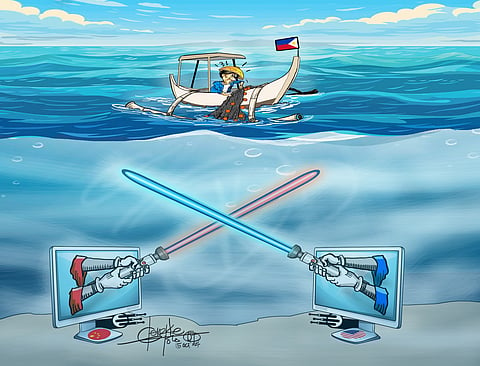
- NEWS
- the EDIT
- COMMENTARY
- BUSINESS
- LIFE
- SHOW
- ACTION
- GLOBAL GOALS
- SNAPS
- DYARYO TIRADA
- MORE

In the current state of geopolitics where conflicts are engulfing parts of the world, the security of information has become pivotal, making the internet a vital front where battles are fought as viciously as those on the ground.
The internet highway or the submarine fiber optic cable network around the world, through which data zips faster than the blink of an eye, is the artery of trade and commerce that makes it a potential target for attack during a conflict.
The fiber optic grid crisscrossing the globe, found mostly under the seas, is also through which more than 95 percent of communications is transmitted.
In the Asian region, the Philippines is among the likely hotspots in the event of a conflict between superpowers. The country, because of its position on the globe and its unique Western ties, is the center of the international data backbone. By this year, there will be seven trans-Pacific subsea cables connecting the Philippines to the US.
The campaign to secure the grid has been ongoing for years highlighted by the friction with Pacific Light Data Communication (PLDC), the company that has a substantial Chinese ownership and that had partnered with Google and Meta (formerly Facebook).
In 2020, however, Team Telecom of the US Department of Justice recommended disapproval of the undersea cable connection to the US. Giants Google and Meta refiled their application to connect Taiwan and the Philippines to the US, abandoning the Hong Kong portion, and “without ownership and control by a Chinese entity.”
Due to the American pressure, the Dr. Peng Telecom Media Group, a Chinese stakeholder in PLDC, sold its stake at a loss in February 2022 and was replaced by a Canadian investor.
With the aggressive moves of China in the West Philippine Sea, concern has grown over the submarine structures.
China retaliated for the American siege on PLDC by delaying its approval of permits for companies to repair or lay new cables under the sea.
Concerns were raised at the recent UN General Assembly about the security of the global cable network.
The US, Australia, France, Japan, Singapore, South Korea and the UK issued a joint statement calling for undersea cables to be secured from risks that include surveillance, intentional damage and compromise of data and communications.
The Center for Security Strategy and Technology at the Observer Foundation in New Delhi cited in a report the risk of surveillance and snooping by Chinese telecom companies, including the risks posed by undersea cables.
Data transmitted through undersea cables that could be compromised include information about US military personnel and the movements of warships and other military assets.
China’s HMN Technologies is the latest entrant into the specialized field of cable laying that previously was dominated by just three companies: US-based SubCom, French firm Alcatel Submarine Networks and Japan’s Nippon Electric Company.
HMN Technologies was once owned by Huawei and is still considered by the US to be an affiliate of the Chinese tech giant.
Huawei’s equipment has been banned in the United States and other countries over fears that they can be used for espionage.
A Washington Post report said that concerted US lobbying has led to three other trans-Pacific cable projects being routed through the coastal waters of Indonesia and the Philippines to avoid Beijing-claimed waters, inflating the costs of the projects.
Chinese state mouthpieces said the concerns about the security of submarine cables is a two-way street since Beijing also worries about espionage or sabotage when cable-laying ships of the US and other Western countries operate in areas China claims.
China also has a huge commercial motivation for dominating the fiber optic grid. Preventing foreign companies from operating in their claimed territories would allow it to continue to dominate the network, providing ongoing business for its companies and fulfilling its digital Silk Road ambitions.
Chinese companies, while relatively new to the field, have become highly competitive with Western cable-laying companies by offering to build and repair subsea cables at cheaper cost.
Securing the communications infrastructure is a vital component for shielding the sovereignty and dignity of the Philippines.
